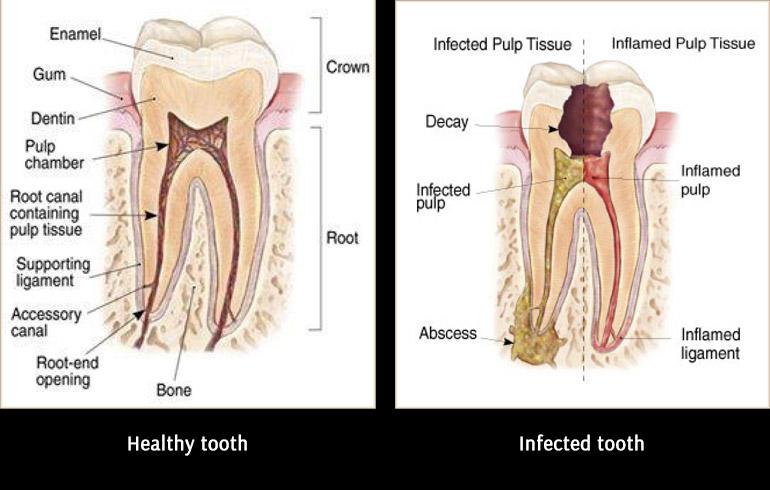Relieve pain and save your teeth with advanced root canal treatment in Napier
In its first comprehensive oral health survey in more than 20 years, the Ministry of Health in 2009 reported around half of 12- to 13-year-olds had at least one cavity. And, while dramatic improvements in oral health were noted, the survey concluded that dental decay is the most common chronic disease in New Zealand. Furthermore, around half of adults surveyed also said they needed to visit the dentist. They reportedly failed to get necessary care due to “cost.”
At Dentiq, we cost-effectively resolve painful decay and disease with root canal treatment. From our office in Napier, Dr Sundar helps you avoid the trauma, cost, and embarrassment associated with tooth loss. Root canal therapy preserves natural teeth. Moreover, it may be the only way to preserve a badly damaged tooth due to deep inflammation and infection caused primarily by dental decay and periodontal (gum) disease.
The truth about root canal therapy
Let’s clear up a few things first. There are several misconceptions about root canal treatment. This procedure does not cause pain. It provides relief from the intense pain and pressure associated with the oral conditions that root canal treatment resolves. We also use precision, a local anaesthetic, so you will not feel anything during treatment. Root canal therapy is not extensive or time-consuming. Instead, think of the procedure as a “deep clean” for the inside of your tooth. As such, it requires little more time chairside than a simple filling. Additionally, in Dr Sundar’s skilled hands, lingering bacteria and harmful substances are thoroughly removed from the tooth. Since the sterilised, clean tooth is sealed off with a filling, the risk of re-infection is minimised or eliminated.
If it has been a while since your last dental visit or are still a little anxious about treatment, we understand. We look forward to discussing options to keep you the most comfortable and relaxed as possible in the treatment chair.
Root canal treatment at Dentiq Dental in Napier

What is root canal treatment?
Hi, I’m Dr. Sundar Jagadeesan from Dentiq in Napier. I want to speak to you about root canal treatment.
A root canal treatment is performed when the nerve inside the tooth has died or become irreversibly inflamed or infected.
The treatment includes removing the tooth nerve tissue, cleaning and disinfecting inside the nerve canal, and sealing the nerve canal.
What are the benefits of root canal treatment?
A tooth can be saved that would otherwise have to be removed due to infection or nerve damage. Chronic inflammation that occurs with inflammation may be eliminated.
This inflammation is harmful to your overall health, and the infection can spread to other parts of the body, including your brain and heart, which can be fatal.
Pain or sensitivity caused by the damaged nerve can be relieved.
What are the risks?
Although 90% of root canal treatments are successful, a small number of teeth will require a second root canal procedure or additional treatment on the root bed.
Even with the best care, root canal treatment may not resolve all the infections or inflammation.
In those cases, the tooth may still be lost, usually due to a hidden deep crack in the tooth or a root canal system too small to be adequately cleaned and concealed.
Are there any further treatments needed following a root canal?
Yes, the back tooth might need a crown to protect the tooth after the root canal treatment from future cracking or fracture from chewing forces.
If the tooth already has a healthy well-sealed crown, we might be able to seal the root canal without replacing the crown.
We might do a tooth-colored filling to seal and support the tooth if it is a front tooth.
What are the alternatives to undergoing root canal treatment?
The only alternative would be to remove the tooth.
An infected tooth or nerve cannot be fixed.
Antibiotics can be used as an adjunct therapy in dentistry but not as a final cure.
Give us a call and visit us at Dentiq to discuss your options at your comprehensive exam.
What to expect
We have provided a glimpse into some of the steps involved during root canal therapy in the above section. To expand a bit, if our dentist determines that you are an appropriate candidate for root canal therapy, he will start the process by numbing the treatment site. The affected tooth is then gently opened up, which relieves often painful pressure. The innermost part of the tooth is accessed. Then, the root canals that contain inflamed and otherwise damaged pulp tissue are sterilised and reshaped. Filling material is applied to seal off the treatment site. The “finishing touch” is a lovely porcelain crown or other restoration designed to restore the tooth’s healthy appearance and function.
At Dentiq, we have taken a process that is already quite effective and efficient and made it even more comfortable, convenient, and precise. Our onsite equipment and technologies support the most pleasant experience at the dentist’s office. To discover the ease of advanced dentistry, schedule an appointment with Dr Sundar. Phone our office on 06 880 6161.

Educatonal Video - Root Canals

Root canal therapy is a very common procedure. It has a reputation of being undesirable and painful. But when done properly it is actually painless. Every tooth in your mouth is composed of a crown and a root. When a cavity or bacteria penetrates the tooth, the root and its nerves become irritated. As a result, the bacteria within the pulp cavity needs to be removed and cleaned in order to restore the tooth to its healthy state. Following the procedure, the tooth is fragile and consequently is restored with the natural crown for a lifetime of durability. Root canals have a success rate of 95% or greater. Most root canal are diagnosed by patients’ sensitivities to a specific tooth. Be sure to consult your dentist any symptoms or discomfort occur.


